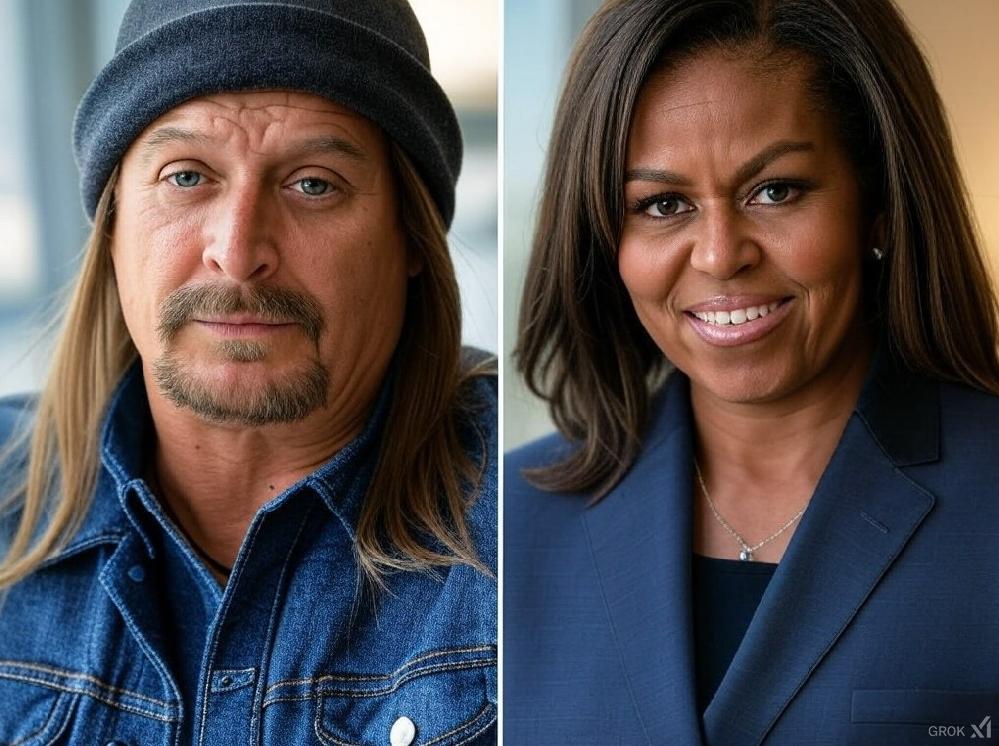Kid Rock’s Bold Message to Michelle Obama Ignites Nationwide Debate
Kid Rock’s Bold Statement About Michelle Obama Triggers National Debate
A recent video featuring musician Kid Rock has gone viral, drawing significant attention and stirring up a nationwide conversation. The video shows Kid Rock addressing Michelle Obama, the former First Lady, regarding her decision to skip Donald Trump’s inauguration. This video, already viewed by millions, has ignited a firestorm of reactions as the public debates the significance of her absence at such a pivotal event.
The Spark of Controversy
The controversy began when it was reported that Michelle Obama did not attend the inauguration of President Trump. This sparked widespread speculation and discussion. Some defended her decision, arguing it was a personal choice without any political undertones. Others, however, questioned whether it was appropriate for a former First Lady to skip such a significant event, which has long been considered a symbol of unity and continuity in American democracy.
As the debate raged on, Kid Rock, known for his outspoken opinions on various issues, posted a video where he expressed his frustration with Michelle Obama’s absence. In his message, Kid Rock challenged her decision and suggested that it spoke to her reliability and trustworthiness. His provocative question, “If you can’t be trusted to show up when it counts, what does that say about you?” resonated with some viewers while sparking intense disagreement from others.
A Strong Critique
Kid Rock’s delivery was blunt and direct, staying true to his signature style. He compared his own sense of duty and commitment to his fans and country with what he perceived as Michelle Obama’s failure to engage in one of the most important national traditions. He argued that former presidents and First Ladies have a duty to attend events like the inauguration to uphold the values of American leadership.
While some agreed with Kid Rock, feeling that public figures should be held to certain standards, others took issue with his approach. Critics argued that Michelle Obama’s absence could have been based on personal reasons, and should not be used as a means of judgment against her character. Nonetheless, the video has sparked widespread debate, with many diving into the nuances of political behavior, public service, and personal choice.
Social Media Response
As the video spread across social media, reactions poured in from all sides. Some praised Kid Rock for speaking out, believing that public figures should be held accountable for their actions, especially when they hold positions of great influence. Others, however, condemned his message, asserting that Michelle Obama’s personal decisions should be respected, and that his comments bordered on disrespect.
The conversation was amplified by news outlets and political commentators, who weighed in on Kid Rock’s statements. Some argued that his critique reflected a deeper public sentiment about transparency and public duty, while others worried it was another example of polarization in the nation’s already divided political landscape.
A Tradition Under Scrutiny
Historically, former presidents and First Ladies have participated in national events like inaugurations as a way to symbolize the continuity of leadership and unity in America. Michelle Obama’s absence from Trump’s inauguration raised questions about how the role of public figures evolves after they leave office and whether there are expectations that should be universally upheld.
Kid Rock’s video directly challenged the notion that former leaders could opt out of these events without facing any consequences. His perspective highlighted the belief that these public traditions are more than just ceremonial; they are vital to maintaining the country’s sense of continuity and respect for the office.
The Role of Social Media in Shaping Debate
The viral spread of Kid Rock’s message underscores the power of social media to ignite debates that span political and cultural lines. A single video can quickly spark intense discussions that transcend the traditional boundaries of news cycles. The controversy around Kid Rock’s comments reflects larger societal debates about accountability, duty, and personal freedom.
For many, the video represents a call to hold public figures accountable for their actions. For others, it is a reminder of how deeply personal decisions are often scrutinized through the lens of politics, even when those decisions are made outside of the public eye.
The Larger Impact on Political Dialogue
Kid Rock’s bold critique is a reflection of the current state of political discourse, where celebrities and media personalities are becoming increasingly influential in shaping public opinion. His message, delivered unapologetically, mirrors the deep polarization of contemporary politics, where every action, every word, and every decision is met with intense scrutiny.
The conversation sparked by Kid Rock’s video is likely to continue to evolve in the coming weeks. Political analysts, public figures, and ordinary citizens will continue to debate the implications of his comments on public service and the expectations placed on those who have served at the highest levels of government. Ultimately, the discussion will contribute to a broader reevaluation of the role of former leaders in the ever-changing political landscape.
Conclusion
The viral spread of Kid Rock’s message has sparked a conversation that is far from over. Whether people agree with his perspective or not, the video has undoubtedly raised important questions about public service, accountability, and the personal choices made by former political figures. The debate over Michelle Obama’s absence from Trump’s inauguration highlights the tension between tradition and personal choice, and underscores the polarized state of modern political discourse.
As the conversation continues to unfold, it is clear that Kid Rock’s message has ignited a larger discussion about the expectations placed on public figures and the role they play in shaping national narratives. Regardless of where one stands on the issue, it is evident that the intersection of celebrity, politics, and public responsibility will continue to shape the public discourse for years to come.
